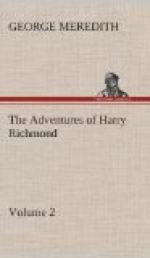I said, ‘No, my father’s.’
From that we opened a conversation, the sweetest I had ever had away from him, though she spoke shyly and told me very little. It was enough for me in the narrow world of my dogs’ faces, and the red-leaved creeper at the window, the fir-trees on the distant heath, and her hand clasping mine. My father had many faults, she said, but he had been cruelly used, or deceived, and he bore a grievous burden; and then she said, ‘Yes,’ and ‘Yes,’ and ‘Yes,’ in the voice one supposes of a ghost retiring, to my questions of his merits. I was refreshed and satisfied, like the parched earth with dews when it gets no rain, and I was soon well.
When I walked among the household again, I found that my week of seclusion had endowed me with a singular gift; I found that I could see through everybody. Looking at the squire, I thought to myself, ’My father has faults, but he has been cruelly used,’ and immediately I forgave the old man; his antipathy to my father seemed a craze, and to account for it I lay in wait for his numerous illogical acts and words, and smiled visibly in contemplation of his rough unreasonable nature, and of my magnanimity. He caught the smile, and interpreted it.
‘Grinning at me, Harry; have I made a slip in my grammar, eh?’
Who could feel any further sensitiveness at his fits of irritation, reading him as I did? I saw through my aunt: she was always in dread of a renewal of our conversation. I could see her ideas flutter like birds to escape me. And I penetrated the others who came in my way just as unerringly. Farmer Eckerthy would acknowledge, astonished, his mind was running on cricket when I taxed him with it.
’Crops was the cart-load of my thoughts, Master Harry, but there was a bit o’ cricket in it, too, ne’er a doubt.’
My aunt’s maid, Davis, was shocked by my discernment of the fact that she was in love, and it was useless for her to pretend the contrary, for I had seen her granting tender liberties to Lady Ilchester’s footman.
Old Sewis said gravely, ‘You’ve been to the witches, Master Harry’; and others were sure ‘I had got it from the gipsies off the common.’
The maids were partly incredulous, but I perceived that they disbelieved as readily as they believed. With my latest tutor, the Rev. Simon Hart, I was not sufficiently familiar to offer him proofs of my extraordinary power; so I begged favours of him, and laid hot-house flowers on his table in the name of my aunt, and had the gratification of seeing him blush. His approval of my Latin exercise was verbal, and weak praise in comparison; besides I cared nothing for praises not referring to my grand natural accomplishment. ‘And my father now is thinking of me!’ That was easy to imagine, but the certainty of it confirmed me in my conceit.
’How can you tell?—how is it possible for you to know people’s thoughts?’ said Janet Ilchester, whose head was as open to me as a hat. She pretended to be rather more frightened of me than she was.




